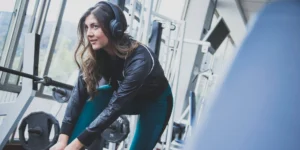
Real estate developers are racing to build residences that support fitness and wellness-obsessed Gen Z
Gen Z is doing more than just taking over the gym — their investment in fitness and wellness is influencing residential real estate design for the long haul.
The group of young consumers have been dually crowned ‘Generation Active‘ by Les Mills for its fitness devotion and ‘Spend Z’ by NielsenIQ for its immense future spending power, setting the stage for a generation that is expected to devote its hard-earned dollars to longevity-supporting measures.
Gen Z is a unique crowd that departs from prior generations — they are digital natives, have delayed marriage and parenthood, and in 2022, headed 7.9 million renter households, according to recent findings by the Joint Center for Housing Studies of Harvard University. While the report notes that Gen Z has higher homeownership rates than millennials did at the same age, the findings suggest that young people have taken to the flexibility that renting provides.
And just as gyms and boutique fitness studios are adapting to meet the desires of Gen Z with personal training and increased strength training equipment, real estate developers are quickly following suit — and are on track to complete nearly 520,000 rental units by the end of the year, a 30% increase from 2022.
Healthy Homes
As the Global Wellness Institute (GWI) notes, health is the new wealth, and the latest luxury is wellness — but when it comes to residential living, it won’t be reserved for just high income earners.
According to a GWI report exploring the burgeoning wellness real estate market and future predictions, amenities such as gyms, spas, pools and elements that encourage mindfulness, sleep and mental and social wellness are expected to be featured in mid-market and affordable properties sooner rather than later.
Mixed-use apartment buildings are already presenting opportunities for fitness and wellness brands to set up shop, making it convenient for young residents invested in health. The new Commodore apartments in Arlington, Virginia, boast an expansive fitness center, waterfall pool, outdoor deck with lounge seating, and co-working spaces for its residents, while its ground level features YogaSix, with Rumble Boxing moving in soon.
Other residential buildings are taking a simple approach: filling their fitness facilities with premium equipment in order to attract young fitness enthusiasts. In Washington, D.C., The Collective offers tenants a fitness facility equipped with brand new Peloton bikes and weekly instructor-led spin classes.
Ensconced in Wellness
Still, other developers are taking it a step further, such as Boston-based real estate developer Redgate, which has created a haven of health and wellness with Gibson Point in Revere, Massachusetts. The high-end, 291-unit waterfront property touts a fitness center, a studio space designed for yoga and barre, a zen garden, a sauna, cold plunge pool and a recovery-focused room equipped with massage guns, Therabody foam rollers and Normatec compression boots. Residents also have the ability to book massages and can enjoy an indoor/outdoor co-working area with standing treadmill desks.
“From our state-of-the-art cold plunge pool to serene on-site spa experiences, every amenity at Gibson Point is meticulously curated to nurture mind, body and soul,” Redgate principal Damian Szary said.
Gibson Point follows a concept that Life Time has employed with Life Time Living, a luxury living experience with residential spaces in Connecticut, Florida, Massachusetts and Nevada emphasizing all things fitness, wellness and socialization — pillars of the athletic country club brand. In addition to club access, Life Time Living offers concierge services for residents that include customized weekly meal prep delivery, personal training, nutrition coaching and massage therapists.
While real estate developers continue to integrate fitness and wellness experiences in residences both upscale and mid-market, high-value, low-price (HVLP) chains such as Planet Fitness, Crunch Fitness and EoS Fitness are continuing to cater to the Gen Z fitness community.
New Planet Fitness CEO Colleen Keating recently told investors that Gen Z continues to make up the majority of Planet’s net new joins each quarter.
The big box gym giant has been sowing fitness seeds with young consumers through its successful High School Summer Pass Program, which invites local teens to work out for free in Planet Fitness gyms during the summer months. Now in its fourth year, Keating says the program has paid off, resulting in a 5.5% conversion rate to paying members in 2023.
